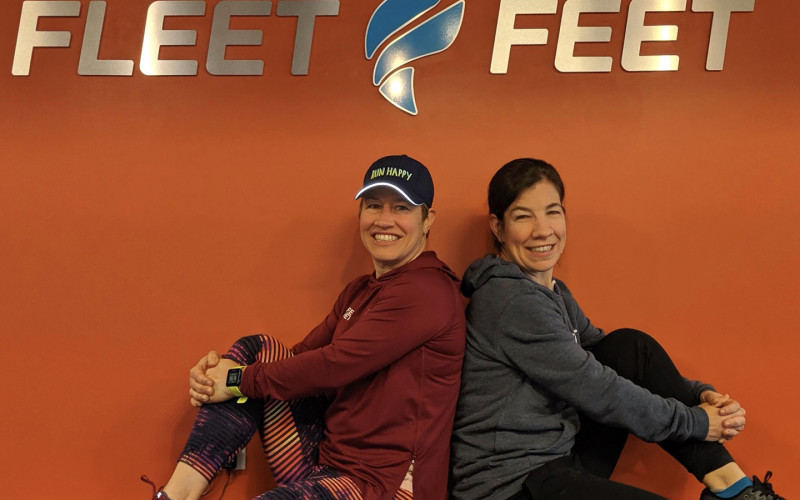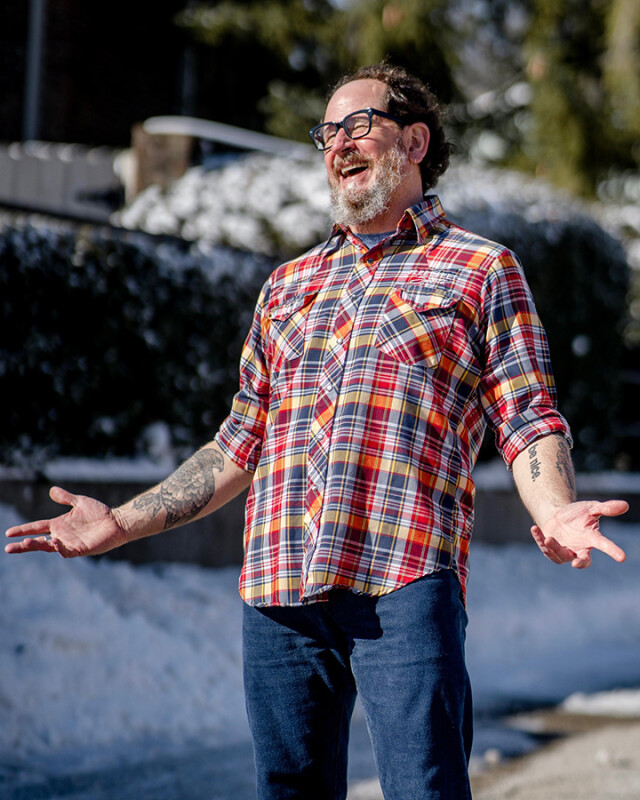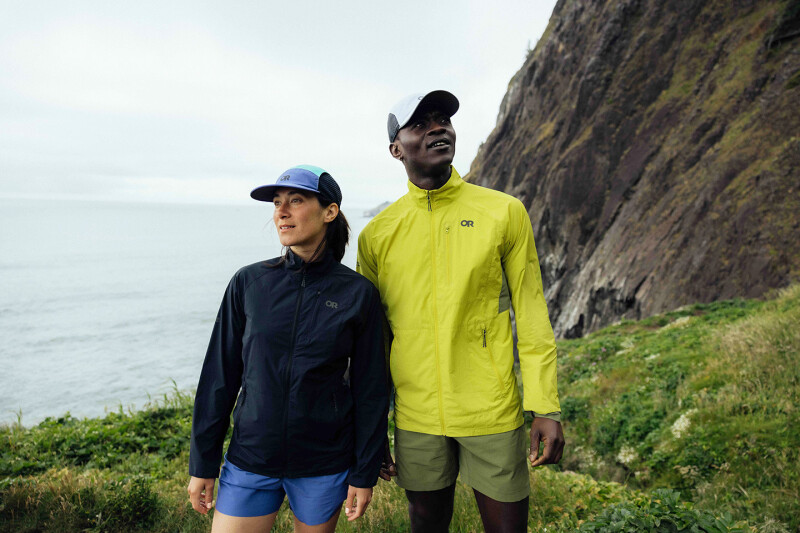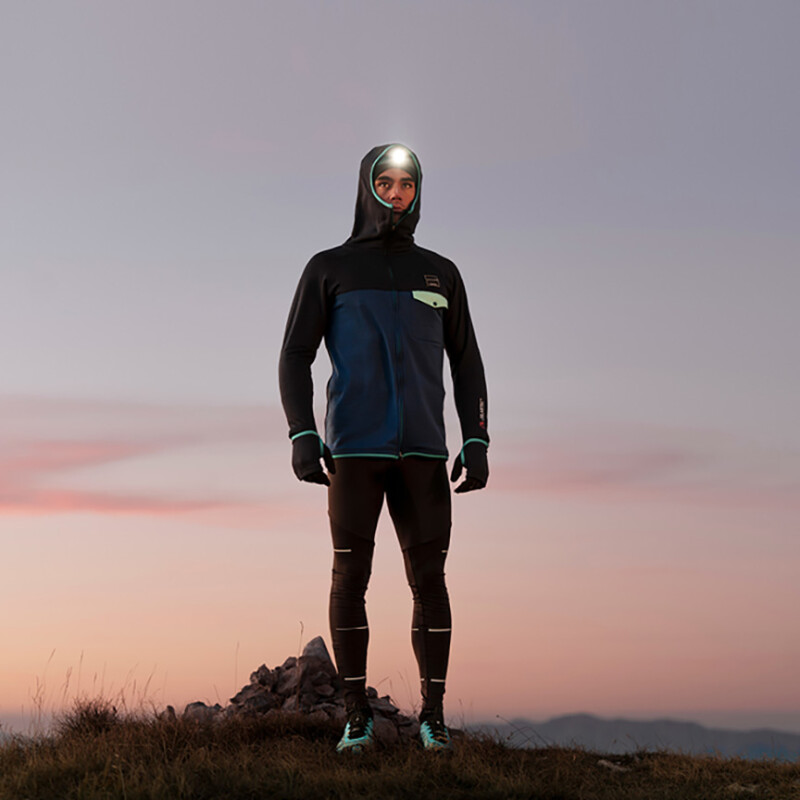Running Insight caught up with the Blozy Sisters earlier this month as part of our ongoing “Women Who Run This Business” column. The sisters took turns handling our questions and they provide an intimate look at how they got where they are, the impact of the COVID-19 pandemic and how they are able to run a business and live together.
First, tell us a little of both of your backgrounds and how you both got into the world of running.
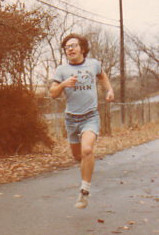 Steph Blozy: Our love of running began when we were little thanks to our dad catching the running bug in the early 70’s. One of my favorite photos of him was him cranking out sub 6:00 miles while rocking cut off jean shorts (with a belt) and Converse high tops – a far cry from the featherweight split shorts and carbon-plated shoes we can’t run without these days.
Steph Blozy: Our love of running began when we were little thanks to our dad catching the running bug in the early 70’s. One of my favorite photos of him was him cranking out sub 6:00 miles while rocking cut off jean shorts (with a belt) and Converse high tops – a far cry from the featherweight split shorts and carbon-plated shoes we can’t run without these days.
And he brought the both of you along?
Steph: Yes, our dad would bring us to his races and sign us up for the Fun Run back when fun runs weren’t just for kids. In those days, anyone slower than a 9:00 mile would run the fun run because they weren’t fast enough to be in the “real” race. When I was five, I remember sprinting past a woman at the finish line of one of those races and hearing the announcer call out that Shelley Bamberger, then a local radio celebrity, had just been passed by a kid. I was so proud of myself. At that moment I fell in love with running.
Carrie: While I didn’t beat Shelley Bamberger, I do remember passing all of the big kids during a kids’ race our little town hosted when I was four. Family legend has it that I was wearing a dress and white ruffled socks.
And now you sell running apparel, but no dresses?
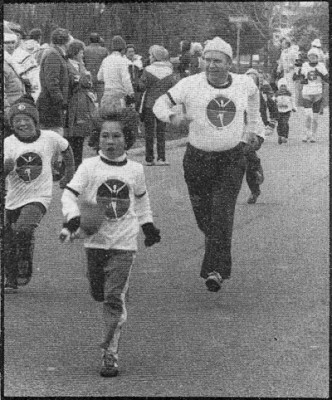 Carrie: As I grew older, I ditched the dress in favor of my Umbro soccer shorts and cotton T-shirts. One of my first purchases when I was gainfully employed after college was a Moving Comfort shirt with the slogan “A Fit Woman, is a Powerful Woman.” That slogan really resonated with me. I loved shopping the sales at Racquet & Jog in Rockville, MD as well as the Sport Hill catalog. I may still have one of their Infuzion half zips.
Carrie: As I grew older, I ditched the dress in favor of my Umbro soccer shorts and cotton T-shirts. One of my first purchases when I was gainfully employed after college was a Moving Comfort shirt with the slogan “A Fit Woman, is a Powerful Woman.” That slogan really resonated with me. I loved shopping the sales at Racquet & Jog in Rockville, MD as well as the Sport Hill catalog. I may still have one of their Infuzion half zips.
Steph: About 10 years after my first races I fell in love with running apparel when I won my age division at a local race and won a gift card to Bob Roncker’s Running Spot. I used the gift card to buy a pair of electric blue Hind Lycra tights. Those tights made me look as fast as I felt.
So tell us about how you took that love of running – and running clothes – and turned it into owning your own store.
Steph: Owning and operating a run specialty store was a second career for both of us. I studied meteorology in college and worked in that field for about 15 years. I started as a forecaster but then moved into marketing and operations. My claim to fame was being the “Chief Chirp” for one of the original desktop apps called WeatherBug.
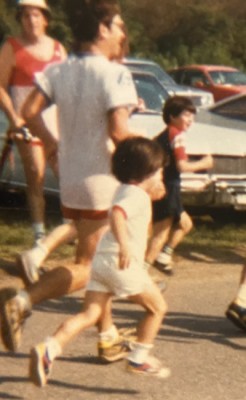 Carrie: I took my love of numbers and politics and got a degree in International Affairs. I worked as an International Trade Analyst for the U.S. Dept of Commerce in their Antidumping and Countervailing Duties division. I spent over 10 years traveling to the far corners of China, India, South America, Russia and the Ukraine to audit companies that manufactured and exported exciting products like steel ball bearings, ironing boards, even crawfish destined for Popeyes restaurants. It wasn’t a glamorous job, but I really enjoyed the detective work needed to analyze the company’s books and operations to determine if they were in compliance. It also led me to get my MBA in supply chain management from the University of Maryland.
Carrie: I took my love of numbers and politics and got a degree in International Affairs. I worked as an International Trade Analyst for the U.S. Dept of Commerce in their Antidumping and Countervailing Duties division. I spent over 10 years traveling to the far corners of China, India, South America, Russia and the Ukraine to audit companies that manufactured and exported exciting products like steel ball bearings, ironing boards, even crawfish destined for Popeyes restaurants. It wasn’t a glamorous job, but I really enjoyed the detective work needed to analyze the company’s books and operations to determine if they were in compliance. It also led me to get my MBA in supply chain management from the University of Maryland.
Steph, what were you doing while your sister was roaming the world looking for criminals?
Steph: While Carrie was getting her MBA, I was pursuing a master’s degree in Exercise Science triggered by a curiosity that running/exercise seemed to keep my Lupus flares at bay. I wanted to learn why — and I wanted to change careers so I could teach others about the importance of exercise and make them healthier too.
How did you take the next step?
Steph: The idea that we could capitalize on our individual strengths and go into business together with a product we were both passionate about – running apparel – was sparked by a wine-enhanced conversation on New Year’s Eve in 2005. I even wrote a newsletter article about it several years ago:
Our dream began when we were little girls. We loved playing store. One year we even got a huge cardboard storefront for Christmas. It was awesome! We talked about owning a store together one day, but our career paths diverged after college with Carrie pursuing a career in international trade and me in weather. But as we sat in front of a fire on New Year's Eve in 2005 talking about our life goals, our dream of being business owners resurfaced.
We agreed that the business would have to be something we were both passionate about, which narrowed our options to chocolate and running. We figured that opening a running store was the best choice since it would enable us to continue our enjoyment of chocolate without consequence.
We researched the world of running retail and decided that since neither of us had any real retail experience, we would open a Fleet Feet Sports store because of their sound business model and excellent support. We found a great location near Nashua, NH, and submitted our application. After Fleet Feet Inc approved our application, they asked if we would be interested in purchasing an existing store rather than opening up a new one. We said "yes," but only if it was within a two-hour radius of Hartford since our parents had recently relocated there from Ohio. They replied saying they thought that we'd be happy with the location.
The next day I received a call from Alice Gold. She had heard that we were interested in buying her store. I told her that we were, but were curious to know where her store was located. I couldn't believe my ears when she said "West Hartford" — 1.4 miles from my parents' house!
As we got further along in negotiations, I began to get cold feet, thinking that maybe Carrie and I didn't have enough knowledge to run a business. So, I put our dream on hold while Carrie finished her MBA and I completed my Master's degree in Exercise Science while working part-time at Fleet Feet Gaithersburg. I told myself that if the store was still available when I graduated, then it was really meant to be. And the rest is history.
So let’s talk about how two sisters are able to run a business together. How do you split your duties?
Steph: One of our biggest strengths is that we both love different aspects of the business. I tend to manage the front of the house – marketing, events, staff management, customer relations – while Carrie handles the back — accounting, inventory, buying, data analysis. We trust in each other’s’ abilities and don’t micromanage.
Sounds nice and peaceful.
Steph: Yes, there are some times when we disagree — I tend to make decisions on the fly and am more willing to take a risk, whereas Carrie likes to have a plan backed up with data. But the great thing about being sisters is that we have it out and then move on. We’ve built the business upon a foundation of integrity, respect and a passion for making our corner of the world a little bit better.
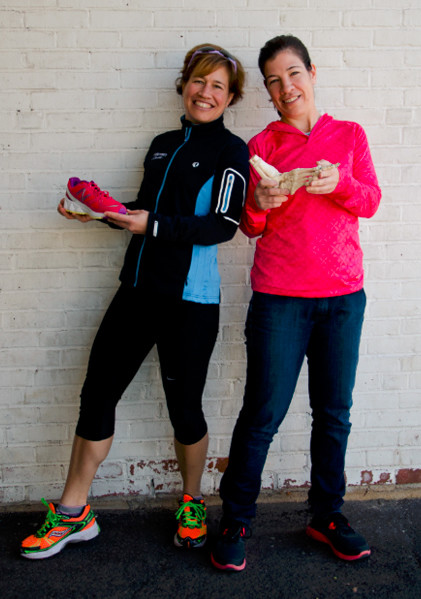 So, how has the past year been for you, personally and professionally, in dealing with the pandemic?
So, how has the past year been for you, personally and professionally, in dealing with the pandemic?
Carrie: It’s been a roller coaster of a year. I’ve always been amazed at how quickly things can change, but COVID-19 has taken it to a new level. In January/February, sales were up and our biggest concern was staffing. We had six open positions and were having trouble finding qualified people to even apply.
And then it all changed …
Carrie: Oh yea. Then came the shut-down in March and our challenges quickly shifted to cash flow concerns and figuring out how to do business when we couldn’t allow people in our store for 69 days. We were scrappy and our hard work paid off as we were able to pay all of our bills on time and managed to create enough business to support bringing a portion of our staff back to work even when we closed.
That has certainly been a hallmark of the run specialty business the past year. So what happened next?
Carrie: When we were allowed to re-open in May, our challenges shifted to a new way of operating such that customers and employees felt safe while still offering a best-in-class experience. Mask wearing, social distancing, constant cleaning, shifting to appointment-based-fitting, contactless curbside, online sales fulfillment and home delivery. Our resilient staff rocked it all and allowed us to end the year only nine percent down despite being closed for two of our busiest months.
And how are things these days?
Carrie: The latest challenge is inventory shortages. We’re learning to navigate this, too. The biggest lesson of the past year is to not get too caught up in the small details. There were so many unknowns during the year that could take us down a rabbit hole, but we didn’t let that paralyze us. We focused on the things that we can change, which seemed to change every day, and kept a positive attitude. It was really inspiring to see our staff come together and help us accomplish amazing things even when our hands were (figuratively) tied behind our backs.
What is your “typical” day like these days?
Steph: One of our business strategies has always been that Carrie and I try to do as much of the behind-the-scenes work as possible, including shipping, receiving, inventory and e-com fulfillment, since they don’t directly produce revenue and we can use the money saved to pay our sales staff a more competitive wage. This usually means a seven-day workweek, but this isn’t just a business to us. It’s our passion and our contribution to making our community a better place. That hasn’t changed.
Has that changed much in this environment?
Steph: We’ve tried to keep our routine as close to pre-pandemic as possible. We feel lucky that we were able to continue going into to store versus the isolation of working for home, although we do lament missing out on the bread baking and Marie Kondo crazes. We still get our morning exercise in – whether that’s a run or CrossFit class – before heading to the store, where it almost feels like normal, except that everyone is wearing a mask and there are no high-fives or hugs.
Any other changes besides the no-hugs rule?
Steph: We’ve also become experts at cleaning shoes, especially the outsoles, and wrapping them in fresh tissue paper to make them look brand new before they are packaged up for e-com. We’ve taught our dad to help with this task and it’s been a lot of fun working alongside him — and the social interaction with the staff has kept his spirits up during the pandemic.
Since this is appearing in our “Women Who Run This Business” column, we want to ask: Do you view yourselves as women in the run specialty business or simply professionals in the run specialty business?
Carrie: Most of the time, we just consider ourselves as professionals in the run specialty business. It’s only when we go to a conference or trade show that we realize that we’re in the minority, but we’ve been treated very well by our male peers in this industry.
Steph: I agree. I’ve never felt like I didn’t belong or that there was a glass ceiling that I had encountered in my previous jobs. That said, it was a highlight attending the women’s group empowerun founded by Kathy Dalby and Burke Beck and being surrounded by like-minded, strong, smart women who bring fresh ideas and spice to our industry. Women tend to be nurturers and that quality pays huge dividends when creating a running community.
Any other benefits we might not be aware of?
Steph: Well, being woman-owned sometimes means that salespeople tend to think that the store owner is a male so even if I answer the phone or meet them on the sales floor, I can pretend that the owner is unavailable to meet/talk. Ha ha.
Being sisters is certainly a unique feature of your business. How do you manage both your professional and personal lives working so closely together?
Steph: Crazily enough, not only do we work together, but we share a home together.
Wow, that is close. How did that come about?
Steph: At first it was because I had to sell my house and use my savings in order to raise enough capital to purchase the store. But, as time went on, it just became convenient and helped with business communications. Plus, neither one of us are married so sharing a home with someone makes life a whole lot less lonely.
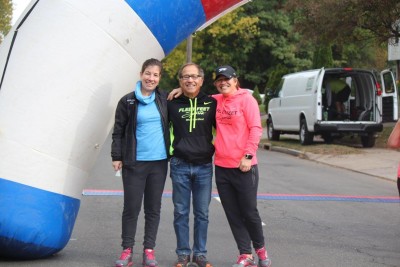 So how do you manage to work and live together?
So how do you manage to work and live together?
Steph: The key to our relationship is that we have completely different strengths and interests — whether it be in business, social circles, hobbies, even training methodologies — she likes to start out fast and then get slower, while I’m all about the negative splits. In the store, I definitely prefer the people side and Carrie loves the data. She is great at analyzing our numbers to find weaknesses and areas to be improved, as well as the strengths of our business so we can keep focus on those. When we respect our areas of expertise, we can elevate our success such that 1+1=3.
Carrie: Dave Spetnagel, owner of Fleet Feet St. Louis, once said that the secret to successfully managing a business with a partner – be it a spouse or otherwise – was that “each person needs to stay in the lane.” Steph and I do that really well. There are times when we start veering into the others lane, but the other usually shuts that down pretty quick.
Does the fact that you are a sister-owned business ever come up in conversations with customers? If so, what's the reaction?
Carrie: Yes, frequently. People seem amazed that we are able to work together, although sometimes customers think that we’re the same person since we look alike and have so many of the same mannerisms. Staff seems to just roll with it and treat us like they would their parents when it comes to knowing who to ask to get what they want.
Steph: I think customers find it curious yet cool that we own a business together. They wished they had that kind of relationship with their sibling. I know I am fortunate to have such an amazing relationship with my sister. We support, encourage and bring out the best in each other. There is no one I’d rather do this crazy thing with!
Run specialty is actually more equal in gender participation than many other businesses. Just look around The Running Event (when we can have it again) and see how many women are walking the aisles and working in the booths. Do you agree? If so, why do you think that is?
Carrie: While males still make up the majority of competitive runners, the majority of our customers are women – middled-aged women like us too – as they seem more attuned to a healthy lifestyle and want the service and expertise we provide. They also make up a higher percentage of participants in local races. Despite run specialty stores servicing more women, I think males make up a higher percentage of employees in this industry. Maybe it’s because companies think that male runners make them seem like a more legit performance brand – though, it’s been awesome to see the rise and leadership of Wendy Yang at Hoka, Ann Cavassa at Saucony, Melanie Allen at Brooks and other female store owners who are finding their voice and showing that women can run this world too.
What do you bring to your store with a woman’s perspective as compared to any male store owners?
Steph: Women tend to be more nurturing, which bodes well for developing and taking care of a community — I’ve been referred to as a Mother Hen. I also think we connect better to the female customer who makes up the majority of our customer base. We understand that sometimes it’s not about how fast the shoe is, but rather how cute that shoe makes our feet look. That sometimes, you just need some inspiration and kind words and encouragement that you can achieve your wildest dreams – whether that’s to complete a marathon or start your own business.
Carrie: Women tend to be comfortable wearing lots of different hats. We aren’t afraid to do jobs that are stereotypically male or female and we embrace our underdog role. For better or worse, we wear our hearts on our sleeve and I think that helps us connect to people on a very human level.
What advice would you give to other run specialty retailers about reaching out and merchandising to female runners?
Steph: Females are an important part of our business. Not only do they personally make up a large percentage of our customer base, but they influence others — husbands, kids, girlfriends, parents. Women tend to feel comfortable and non-intimidated around other women. Having female staff and merchandising products to attract them, will generate sales in the moment, as well as create a sales stream in the future. I like to think that women are the future of running retail.
Carrie: Bra sales can be a large revenue generator – but those sales are tough when your staff and store atmosphere skew male. When we had our Women’s Annex space that specialized in sports bras, we sold 300 sports bras a month. When that space closed, our bra sales shrunk to less than 50 a month. If you really want to capture the female customer, you have to speak her language in words, deeds and product offerings.
What advice would you give to any young (or older) women considering following a similar career path in the run business?
Steph: First, regardless of whether you are a man or woman, you are never too old to start a new chapter or adventure in life. Follow your passion. I believe that the best person to bet on is yourself. If you really want something, it’s up to you to work hard and gain the skills and education to make it happen. Don’t rely on others to do it for you. Never think of yourself as weak or not good enough. Set yourself up for success with the right education and a strong network of support, including people whose skills and talents fill your holes/weaknesses.
And Carrie, your advice?
Carrie: First, make sure your financial house is in order — manage your money well, pay your bills on time, keep inventory in check. During our first few years in business we lived super frugally and invested the money we made back into the business. Owning a running store is not a get rich quick kind of business.
Sound advice. Anything else?
Carrie: Also, hard work, determination, courage and guts will almost always get you where you want to go. My mom once gave me a business card holder engraved with the saying “Behind every great woman is herself.” Believe in yourself and work hard to show the world that you belong exactly where you are.
Finally, what are you expecting for you and Fleet Feet Hartford in 2021 and what is it going to take to achieve that?
Steph: We’re hoping for a return to more normal business operations where we can host events, community runs and races again. Where it was easier to affect people’s lives for the better. Where we can hug and high-five our customers and reconnect on a personal level.
Yes, we are all looking forward to high-fiving again. How about from a business angle?
Steph: On the more tangible business side, we hope to see an increase in sales over last year as people come out of quarantine and want to spend the extra money they’ve saved by not eating out, traveling and through stimulus checks. With the restart of races, I hope customers want to purchase new race day outfits and accessories so that we go back to selling all four walls of our store.
Carrie: My hope is that the ports become fully operational and that the supply chain returns to normal so we have access to the inventory customers want from us so in-store sales continue to grow and we don’t lose customers to online sales.
Any specific plans to accomplish this?
Carrie: We are bringing in Superfeet’s FitStation as a way to enhance our retail theater and attract customers eager to learn more about their biometrics and how it can help relieve their pain or help them run/walk more efficiently. If there is one lesson we’ve learned as business owners is that the moment you become stagnant and resistant to changing the way you do things – even if the industry has always done them that way – is the moment your business begins to weaken.
You said earlier that staffing was a concern pre-pandemic. Is that still the case as we hopefully head out of it?
Steph: As the economy opens up, we hope to be part of the sector that sees growth. With that is a need for great staff. As bad as the high unemployment rates have been, we hope that it allows us to hire quality people that will elevate our business both in reputation and sales. And with that, we hope to reinvest those dollars into our staff so they can earn a respectable wage – and enjoy one of the best jobs on the planet. Where else do you get the opportunity to change lives for the better and be a daymaker?
